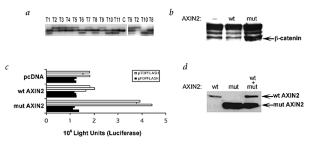Mutations in AXIN2 cause colorectal cancer with defective mismatch repair by activating β-catenin/TCF signalling (original) (raw)
- Brief Communication
- Published: October 2000
- Xiangyang Dong1,
- Ming Mai1,
- Ratnam S. Seelan1,
- Ken Taniguchi1,
- Kausilia K. Krishnadath1,
- Kevin C. Halling1,
- Julie M. Cunningham1,
- Chiping Qian1,
- Eric Christensen1,
- Patrick C. Roche1,
- David I. Smith1 &
- …
- Stephen N. Thibodeau1
Nature Genetics volume 26, pages 146–147 (2000)Cite this article
- 2861 Accesses
- 445 Citations
- 9 Altmetric
- Metrics details
A Correction to this article was published on 01 December 2000
Colorectal cancer (CRC) with defective DNA mismatch repair (MMR) is associated with alterations in one of several DNA MMR genes1. The downstream functional consequences of such defects are unclear. Here we show that AXIN2, encoding a Wnt-signalling component, is mutated in 11 of 45 CRC with defective MMR. The mutations stabilize β-catenin and activate β-catenin/T-cell factor (TCF) signalling, indicating its role in CRC development by linking defective MMR to the adenomatous polyposis coli (APC) pathway.
We analysed the pathological impact of these mutations by immunohistochemical staining of β-catenin. We observed accumulation of β-catenin in tumour cell nuclei in 10 of 11 CRC with AXIN2 mutations (Table 1), but not in the matched normal tissues or in 3 MSI–H CRC without AXIN2, APC or CTNNB1 mutations (data not shown). Immunoblot analysis of normal fibroblast cells transfected with mutant AXIN2 further demonstrated the accumulation of β-catenin in the nuclei (Fig. 1_b_). Screening of the same group of CRC with defective MMR for CTNNB1 or APC mutations, as described6,7,8, identified five CTNNB1 mutations (5/45) and four APC truncation mutations (4/28 from available DNA). None of these mutations were found in the tumours with AXIN2 mutations, suggesting that the AXIN2 mutations, and not mutations in APC or CTNNB1, alter the APC pathway and contribute to the development of CRC in these tumours.
This is a preview of subscription content, access via your institution
Access options
Subscribe to this journal
Receive 12 print issues and online access
$209.00 per year
only $17.42 per issue
Buy this article
- Purchase on SpringerLink
- Instant access to full article PDF
Prices may be subject to local taxes which are calculated during checkout
Additional access options:
Figure 1: Detection and functional analysis of AXIN2 mutations in CRC with defective MMR.

References
- Marra, G. & Boland, C.R. J. Natl Cancer Inst. 87, 1114–1125 (1995).
Article CAS PubMed Google Scholar - Mai, M. et al. Genomics 55, 341–344 (1999).
Article CAS PubMed Google Scholar - Behrens, J. et al. Science 280, 596–599 (1998).
Article CAS PubMed Google Scholar - Liu, W. et al. Nucleic Acids Res. 26, 1396–1400 (1998).
Article CAS PubMed PubMed Central Google Scholar - Boland, C.R. et al. Cancer Res. 58, 5248–5257 (1998).
CAS PubMed Google Scholar - Chan, E.F. et al. Nature Genet. 21, 410–413 (1999).
Article CAS PubMed Google Scholar - Ganguly, A. et al. Proc. Natl Acad. Sci. USA 90, 10325–10329 (1993).
Article CAS PubMed PubMed Central Google Scholar - Powell, S.M. et al. N. Engl. J. Med. 329, 1982–1987 (1993).
Article CAS PubMed Google Scholar - Ishitani, T. et al. Nature 399, 798–802 (1999).
Article CAS PubMed Google Scholar - Rampino, N. et al. Science 275, 967–969 (1997).
Article CAS PubMed Google Scholar - Miyashita, T. & Reed, J.C. Cell 80, 293–299 (1995).
Article CAS PubMed Google Scholar - Peifer, M. & Polakis, P. Science 287, 1606–1609 (2000).
Article CAS PubMed Google Scholar - Kishida, S. et al. Mol. Cell. Biol. 19, 4414–4422 (1999).
Article CAS PubMed PubMed Central Google Scholar - Satoh, S. et al. Nature Genet. 24, 245–250 (2000).
Article CAS PubMed Google Scholar
Acknowledgements
These studies were carried out with the support of funds from Mayo Clinic/Foundation to W.L. and by grants from the National Institutes of Health to D.I.S. (CA 48031) and S.N.T. (CA 60117).
Author information
Authors and Affiliations
- Division of Experimental Pathology, Department of Laboratory Medicine and Pathology, Mayo Clinic and Mayo Medical School, Rochester, Minnesota, USA
Wanguo Liu, Xiangyang Dong, Ming Mai, Ratnam S. Seelan, Ken Taniguchi, Kausilia K. Krishnadath, Kevin C. Halling, Julie M. Cunningham, Chiping Qian, Eric Christensen, Patrick C. Roche, David I. Smith & Stephen N. Thibodeau
Authors
- Wanguo Liu
- Xiangyang Dong
- Ming Mai
- Ratnam S. Seelan
- Ken Taniguchi
- Kausilia K. Krishnadath
- Kevin C. Halling
- Julie M. Cunningham
- Chiping Qian
- Eric Christensen
- Patrick C. Roche
- David I. Smith
- Stephen N. Thibodeau
Corresponding author
Correspondence toWanguo Liu.
Rights and permissions
About this article
Cite this article
Liu, W., Dong, X., Mai, M. et al. Mutations in AXIN2 cause colorectal cancer with defective mismatch repair by activating β-catenin/TCF signalling.Nat Genet 26, 146–147 (2000). https://doi.org/10.1038/79859
- Issue Date: October 2000
- DOI: https://doi.org/10.1038/79859